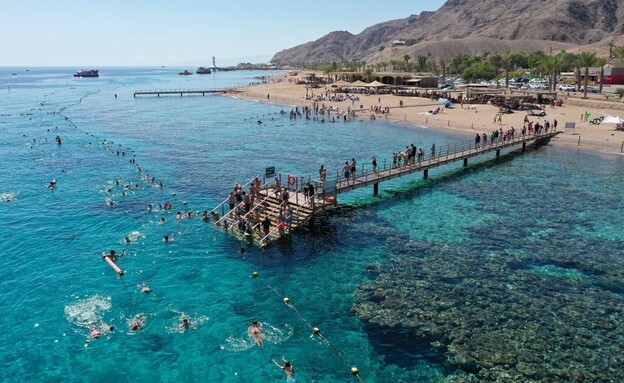Studies show that Eilat Bay corals are known for their unique natural resilience to the rise in seawater temperature and the coral bleaching phenomenon that accompanies it. The resilience of the corals of the Gulf of Eilat is the result of a long-term selection that takes place in the southern Red Sea, in the Egyptian region of Bab al-Mandab, in favor of corals with high resistance to heat. The high temperatures prevailing in this region allow only corals with high heat resistance to enter the Indian Ocean into the Red Sea.
Dr. Assaf Zebuloni explains: “The summer of 2024 was unprecedented and resulted in an unusual heat load, with water temperatures reaching a peak of 31.9 degrees Celsius and maximum daily temperature values that were more than 30 degrees for two consecutive months! From an analysis of satellite data published by the National Oceanic and Atmospheric Administration (NOAA), we found that the cumulative heat load that Eilat reefs experienced during the summer of 2024 was 3.75 times higher than that which causes severe bleaching events in other reefs in the world. In other words, even though the resilience of the corals in the Gulf of Eilat is high and unique on a global level, it turns out that it also has a red line, and it is likely that the reef system has reached a very worrying critical point this year.”
The inevitable reaction of the corals of the Gulf of Eilat to these extreme temperatures was manifested for the first time in the bleaching of many coral species, and these days the Nature and Parks Authority is conducting surveys that will help understand the extent of the phenomenon and the rate of recovery and mortality of the bleached corals. Dr. Zebuloni emphasizes: “There are also many local disturbance factors that may damage the natural resilience of the Eilat Gulf corals. In terms of water quality, for example, the combination of high temperatures and the pollution of the sea with nitrates has a critical effect on the sensitivity of corals to the bleaching phenomenon.”
Today, there is an excess of the amount of nitrates that are discharged from the Israeli coast to the north of the Gulf of Eilat (such as brines that are the output water of the desalination process and of aquaculture) and pressures are being applied to increase the excess. Given the observed rise in sea surface temperatures and the high and unpredictable frequency of heat waves, any excess in the amount of nitrates directly endangers coral reefs, as they significantly increase the probability of a severe bleaching event.
It is important to note that in many cases when marine ecosystems are subjected to extreme conditions (such as heat stress and local stress factors) and are “pushed” to a critical point, the response may be acute and sudden, as happens in many reef areas in the world, and not necessarily a long and linear deterioration. In these cases, the ability to return to the initial state often does not exist, especially in view of the changing climatic conditions that are not under our immediate control, and the burden of disturbance factors that usually increases over time.
So far it seems that the coral bleaching observed in Eilat has not reached a serious state, but it is too early to determine what its long-term results will be. Dr. Zebuloni says: “Given the unique resilience of the coral reefs in the Gulf of Eilat, which gives them special importance on an international scale, the State of Israel has the responsibility to reduce as much as possible local disturbance factors and maintain the water quality in the Gulf of Eilat. Local conservation efforts may preserve the natural resilience of the Eilat corals not only as a national asset, but also as an international asset for us and future generations.

Lamar County, Georgia Arrest Records Look Up | GeorgiaArrestRecords.org
Polk County, Wisconsin Arrest Records Look Up | WisconsinArrestRecords.org
Door County, Wisconsin Arrest Records Look Up | WisconsinArrestRecords.org
Burke County, Georgia Arrest Records Look Up | GeorgiaArrestRecords.org
Knox County, Tennessee Arrest Records Look Up | TennesseeArrestRecords.org
Meigs County, Ohio Arrest Records Look Up | OhioArrestRecords.org
Uintah County, Utah Arrest Records Look Up | UtahArrestRecords.org
Gray County, Texas Arrest Records Look Up | TexasArrestSearch.org
Beaver County, Utah Arrest Records Look Up | UtahArrestRecords.org
Carbon County, Utah Arrest Records Look Up | UtahArrestRecords.org
Greene County, Ohio Arrest Records Look Up | OhioArrestRecords.org
Butler County, Ohio Arrest Records Look Up | OhioArrestRecords.org
Fulton County, Ohio Arrest Records Look Up | OhioArrestRecords.org
Athens County, Ohio Arrest Records Look Up | OhioArrestRecords.org
Bacon County, Georgia Arrest Records Look Up | GeorgiaArrestRecords.org
Cass County, Texas Arrest Records Look Up | TexasArrestSearch.org
Erie County, Ohio Arrest Records Look Up | OhioArrestRecords.org
Bowie County, Texas Arrest Records Look Up | TexasArrestSearch.org
Hall County, Nebraska Arrest Records Look Up | NebraskaArrestRecords.org
Cass County, Nebraska Arrest Records Look Up | NebraskaArrestRecords.org
Cook County, Illinois Arrest Records Look Up | IllinoisArrestRecords.org
Cole County, Missouri Arrest Records Look Up | MissouriArrestRecords.org
Knox County, Illinois Arrest Records Look Up | IllinoisArrestRecords.org
Kane County, Illinois Arrest Records Look Up | IllinoisArrestRecords.org
Bibb County, Georgia Arrest Records Look Up | GeorgiaArrestRecords.org
Craighead County, Arkansas Arrest Records Look Up | ArkansasArrestRecords.org
Columbia County, Arkansas Arrest Records Look Up | ArkansasArrestRecords.org
Tolland County, Connecticut Arrest Records Look Up | ConnecticutArrestRecords.org
Crawford County, Arkansas Arrest Records Look Up | ArkansasArrestRecords.org
Appling County, Georgia Arrest Records Look Up | GeorgiaArrestRecords.org